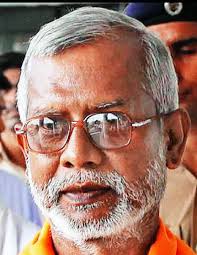New Delhi, Jul 30: Former RSS activist Naba Kumar Sarkar alias Aseemanand, whose confession in December 2010 led to the unraveling of a saffron terror conspiracy behind the 2006 Malegaon blasts apart from several other attacks, may himself be never charged in the case. National Investigation Agency (NIA), which left him out in its recently filed chargesheet in the case, believes that Aseemanand was actually not involved in the blasts that killed 37 people.
Sources said Aseemanand was not in the know of the impending attacks beforehand and came to know of the blasts and a Hindutva fundamentalist conspiracy behind it only after they had occurred. In his confession too, Aseemanand mentions that it was slain RSS pracharak Sunil Joshi who informed him that his boys were behind the blasts.
"In fact, in the beginning, Aseemanand laughed off claims made by Joshi who felt hurt by this. Aseemanand even asked Joshi to reveal the names of the people who executed the attacks if he wanted him to believe the claims. But Joshi refused to do so," a senior NIA officer said.
However, in 2007, Joshi did take Aseemanand into confidence before executing the Ajmer Dargah blasts and thus started Aseemanand's active participation in blasts planned by Joshi. One of the key conspirators in the blast, Devendra Gupta, arrested by Rajasthan ATS in 2010, told investigators that it was Aseemanand and Joshi who roped him into the blast conspiracy. Gupta had arranged for the SIM cards used in the blasts.
It was during this time that Aseemanand came up with the "bomb for bomb" theory and a series of attacks were planned by Joshi with support from Aseemanand, sources said. NIA claims to have evidence against Aseemanand in Ajmer Dargah, Mecca Masjid and Samjhauta Express blasts but says his links to the 2006 and 2008 Malegaon blasts have not been found.
"There is no evidence to link him to either of the two Malegaon blasts. He was very close to Joshi who saw him as an ideological guru and hence shared his plans with him. Sandeep Dange and Ramji Kalsangra, who planned Malegaon 2008, did not share Joshi's enthusiasm about Aseemanand," said the officer. Sources said Aseemanand was influenced by Joshi's commitment and work and helped him financially as well as with logistics.
Maharashtra ATS had arrested and charged nine Muslim men in connection with the 2006 Malegaon blasts. However, after Aseemanand's confession, NIA arrested and chargesheeted four Hindutva fundamentalists associated with Joshi in the case.
Meanwhile, sources said a chargesheet in the Joshi murder case would be filed as soon as the agency gets forensic analysis report on the gun recovered in the case. NIA has failed to file a chargesheet in the case in the stipulated time making the accused eligible for bail.





Comments
Add new comment